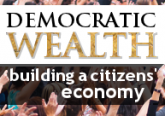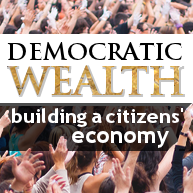![DWlogo3-194px[1]](http://politicsinspires.org/wp-content/uploads/2013/01/DWlogo3-194px1.png) The statement ‘We are the 99%’ has the resounding attributes of any truly powerful slogan. It not only captures an issue but creates an identity. The true power in the slogan is that for perhaps the first time, the myriad interest groups within the 99% realised they had more in common with each other, than the 1%. This is a vital step in any truly republican movement.
The statement ‘We are the 99%’ has the resounding attributes of any truly powerful slogan. It not only captures an issue but creates an identity. The true power in the slogan is that for perhaps the first time, the myriad interest groups within the 99% realised they had more in common with each other, than the 1%. This is a vital step in any truly republican movement.
It’s accurate
In defending the 99% slogan, one must first attest to its accurate portrayal of the single greatest failure of neoliberalism; breathtakingly unequal distribution of wealth. James S Henry, former chief economist for McKinsey and now steering committee member for the Tax Justice Network, presented global wealth distribution figures in 2012 to illustrate this point. According to Henry, just 0.1% of the world’s population owns 81% of the wealth; the other 99.9% of people left with 19% of the wealth. This is a quite stunning failure of an ideology that purports to be the champion of fairness, justice and opportunity. It is quite right that this be called out, and that the 99% understand their position not only relative to each other, but in the broader context which goes practically unspoken in popular discourse.
99% brought solidarity where there was once division
For too long, most have sat by and accepted the wealth iniquities caused by neoliberal policies around the world and at home. ‘We are the 99%’ was a shorthand wake up call for many previously warring factions. Craig Berry’s piece ‘Unpacking the 99%’ does an excellent job in identifying these strata. However, what the piece fails to attribute to the 99% movement is that rather than stepping over these differences, it supersedes them. This is a vital distinction.
The purpose of promoting awareness of the 99/1 division is not intended to say that a middle class family in Bath suffers the same as a chai wallah in Bangladesh. It was rather to communicate that the feeling of scarcity that had pitted poor against poorer and driven people to care more about their own personal prosperity than the impoverishment of others was caused by such a vast pool of available wealth being sequestered by the 1%.
This is a critical perspective to create in the current climate of ideological austerity. If people truly believe the narrative that ‘tough choices have to be made’ they are ready to accept the kinds of egregious policies we are witnessing with the Welfare Reform Act 2012, and continued privatisations of public services. However, if you can keep people focussed on the real total wealth available, and have them ask why they are being asked to fight over the crumbs, you can create a population unwilling to sacrifice its less enfranchised members out of a misguided sense of survival. In this sense the 99% slogan as a group identity is vital. This creates the possibility of a popular, global movement.
Giving a voice to the voiceless
‘We are the 99%!’ is also about making the invisible, visible and the unheard, heard. For some time, a growing disenchantment with neoliberalism among the 99% has failed to be reflected in the institutions of civil society. One of the biggest issues with creating an alternative model to neoliberalism is its supreme dominance in all our major institutions.
Politics in Britain (and one could argue globally) has become dominated by neoliberal ideas, the so called ‘centre ground’ is in fact neoliberalism, and conservatives tend to coalesce on the right side of this, Labour the left. In fact today the only party in the UK with a sitting MP who questions the fundamental ethos of neoliberalism is the Green Party.
In the world of academia, where one might expect alternative political and economic ideas to be formulated and developed, a similar stagnation has occurred. Steve Keen, along with Nouriel Rubini as a non neoliberal economist states, “The first thing that the global financial crisis should therefore do to economics is to galvanise student protest about the lack of debate within academic economics itself, because dissident academic economists will be unable to shift the tuition of economics themselves without massive pressure from the student body”.
There was a similar frustration in the narrowing of the debate in the mainstream media. One of the most significant and enduring achievements of Occupy was to set up its own, user generated media. Channels such as theOccupy News Network in the UK and OWSTV in the US created a means of escaping the bias of a media run either by neoliberal governments or their corporate sponsors.
The statement ‘We are the 99%’ in this context was a plaintive cry for the proof of one’s own existence. In a time when it is felt that the interests and the dissent of ‘the 99%’ were not expressed or expressible within the institutions purported to do so, people took to the streets, the twitterverse, the blogosphere, and their university campuses chanting ‘We are the 99%!’
Similar to the call of the gay rights movement in the 1980’s “We’re here, we’re queer, get used to it!”, this call too was about being visible and unignorable in the face of a power structure working away solely in its own interests.
The rise of the 99%
I read OurKingdom and Politics in Spires’ series Democratic Wealth as inquiring into why neoliberalism, the principles of which have caused the biggest economic crisis since the 1930’s if not ever, has not been superseded by another ideology. By owning the institutions which in previous generations would have been busily developing the ‘next big idea’, neoliberalism has choked off the green shoots of political and academic dissent. Therefore it is on ‘the 99%’ to establish a creative unity, which they may not have been asked to do ever before in history. There is no new idea already complete and waiting in the wings, requiring a wave of popular opposition to neoliberalism to enter stage left.
As the series accurately articulates, the popular movements now are not calls for a specific ideology; they are protests at the lack of alternative ideas when the prevailing ones are so patently unfit for purpose.
The 99% slogan drew in not just the newly frustrated white middle-classes of Britain, but the members of ‘the 99%’ that had been suffering this disenfranchisement much longer. Ethnic minorities, people with disabilities, the drug and alcohol dependent, homeless people, the unemployed, sex workers, pensioners, school children – and together ‘We are the 99%’, the real uncensored outcome of neoliberal policies. Once together, each group got to understand more of the realities of the other and a broader perspective than our own individual interests could be founded. This was an essential first step in creating a more equal, fair, representative society and the idea of ‘the 99%’ was a key enabler of this conversation between ‘the 99%’. As a result, the opposition in academia, the media, and the growth in campaigns is focussed much more widely on the causes of policies which disenfranchise, rather than simply on the policies themselves.
This is why I believe that the creation of the 99% as a related group with global reach, superseding but not ignoring the old lines of class, race and gender, is our single greatest hope for a future political, social and economic organisation worthy of its constituents.
The following piece is a reply to Craig Berry’s Unpacking the 99%, in which he argues that the slogan may be unhelpful for Britain, as it obscures the realities of actual wealth distribution.
It is the final piece of a trio exploring wealth distribution in Britain. See the first, Policy commission on UK wealth distribution, by Karen Rowlingson. It sits within our Democratic Wealth debate, in partnership with OurKingdom.





No Comment